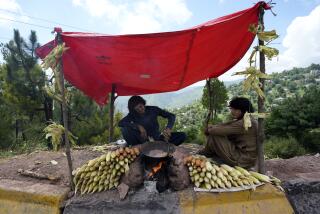A Strained IMF Delivers Fiscal Medicine
- Share via
Reform of the economies of Japan and Russia is essential to maintaining the optimism that has pushed U.S. stock markets to record heights and launched an era of rising confidence across the world.
But there are fears that both Japan, the second-largest economy in the world and the key to Asia’s recovery, and Russia, the erstwhile superpower that once had the world’s second-largest economy, will fail to right themselves.
And the consequences would be dire for the global economy and, by extension, Southern California’s heavily trade-oriented economy. Failure to seize the moment could lead to an erosion of consumer confidence, a decline in financial markets and perhaps even a worldwide recession. Southern California, which has already seen its growth slowed by the Asian crisis, could suffer further.
These are the stakes. On Sunday, voters in Japan opted for change and forced a prime minister from office. On Monday, the International Monetary Fund gave preliminary approval to a $17.1-billion rescue plan for Russia’s ailing economy.
Some business leaders hailed both events as grounds for hope that the post-Cold War move to open markets and rising living standards around the world will continue. Global markets were more restrained in their reactions.
Of the two economies, Russia is seen as nearer the brink. The new loans from the IMF and World Bank, coming on top of $9 billion in IMF loans already pledged to that country, are contingent on the Russian parliament’s agreeing to modernization of its tax collection system and finances.
The economy is close to chaos as it is, with millions of workers going without regular pay. The government lacks money because of widespread tax evasion by powerful institutions that run the economy, the state-connected gas company being a prime example.
*
Russia is now a relatively poor country, with 150 million people and $400 billion in annual output of goods and services. Its standard of living is below those of Hungary and the Czech Republic. Poor economic performance in Russia is not new, but matters have reached a critical point.
If reforms are not made in the tax system, if the elected government is not seen to be able to rule, then the value of the currency, the ruble, will collapse, experts say. And the banking system could well follow.
The result would be internal chaos and perhaps the rise of a new autocratic government backed by the military. Such a turn of events would be a retreat to the days of the Cold War, which semiofficially ended nine years ago.
If that happened, the new confidence that is reforming the economies and politics of Eastern Europe would dissipate; Western Europe would return to the uncertainties of the Cold War era.
Thus, Monday’s IMF action, which included a pledge of $1.5 billion in loans to Russia from Japan, came as medicine to a sick patient.
*
In Japan, the election for half the seats in the upper house of parliament brought a large voter turnout and rejection of the candidates of the Liberal Democratic Party, which has ruled Japan for nearly all of the postwar period.
The vote was an unusual expression of popular sentiment in a country that is frequently but mistakenly described as unable to change. “The voters surprised the LDP,” said Frank Gibney, a Santa Barbara-based author and expert on Japan. Gibney noted the support for Naoto Kan, head of the new Democratic Party of Japan, a figure who has been sharply critical of government bureaucracy and who is now the nation’s most popular politician.
The voters were seen as pressing the government to make changes in the economy by dealing with the problem of massive bank losses and reforming the financial system so that retirement savings can earn an adequate return.
In the larger sense, the issue was whether Japan’s overall economy, built up over 50 years of exporting to the U.S. and other countries under the military protection of the United States, can change to one of open markets that would welcome the goods and services of Asian neighbors and the rest of the world.
Japan, with an annual output of goods and services of $4 trillion, is by far the largest economy in Asia and the largest source of investment for its developing nations. If Japan’s economy, now in recession after seven years of almost no growth, is not able to reform, its lack of buoyancy will drag down those of others in the region.
That’s why U.S. policy has been pushing Japan to reform its economy and become the engine of Asia. Washington, therefore, welcomed the election results.
“A healthy Japanese economy is critical for the Asia region and for the global economy,” said White House Press Secretary Mike McCurry. “And the United States will work on the assumption that the new Japanese government will pursue economic reform expeditiously.”
More to Read
Inside the business of entertainment
The Wide Shot brings you news, analysis and insights on everything from streaming wars to production — and what it all means for the future.
You may occasionally receive promotional content from the Los Angeles Times.










